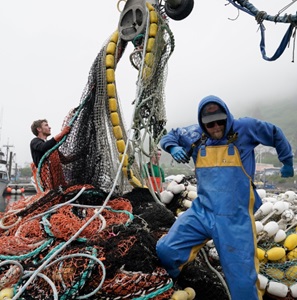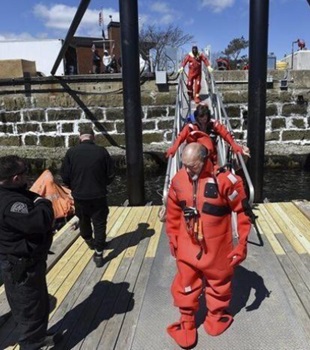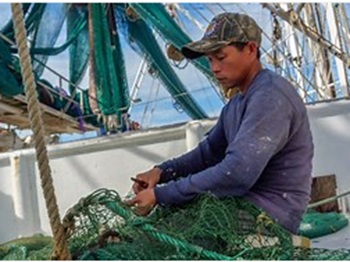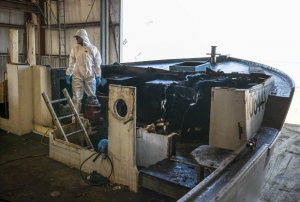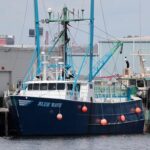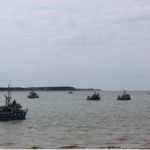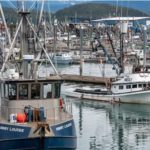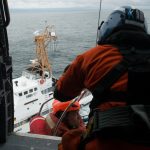Category Archives: Gulf of Mexico
Beaufort leaders ask Gov. McMaster to declare economic disaster to help shrimping industry
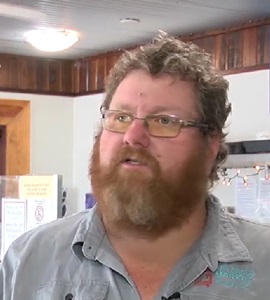 This all comes after local shrimper Craig Reaves sent this letter to city council explaining how shrimp dumping threatens his livelihood, and that of many others. In his letter to council, Reaves says that ‘all commercial fishing families have been decimated.’ He lists multiple reasons for said decimation but says that import dumping is the lead cause. For context, shrimp dumping is when farmed shrimp from other countries is sold to U.S. retailers and restaurants for below the market price that local shrimpers adhere to. Beaufort officials recognize the issue. “You can’t have locally owned operated seafood companies if the market price is going to be debased by this amount of flooded shrimp that’s coming in,” said Beaufort’s Acting Mayor Michael McFee. Video, more, >>click to read<< 08:40
This all comes after local shrimper Craig Reaves sent this letter to city council explaining how shrimp dumping threatens his livelihood, and that of many others. In his letter to council, Reaves says that ‘all commercial fishing families have been decimated.’ He lists multiple reasons for said decimation but says that import dumping is the lead cause. For context, shrimp dumping is when farmed shrimp from other countries is sold to U.S. retailers and restaurants for below the market price that local shrimpers adhere to. Beaufort officials recognize the issue. “You can’t have locally owned operated seafood companies if the market price is going to be debased by this amount of flooded shrimp that’s coming in,” said Beaufort’s Acting Mayor Michael McFee. Video, more, >>click to read<< 08:40
Louisiana Shrimp Season to Close December 18 in Portions of State Waters
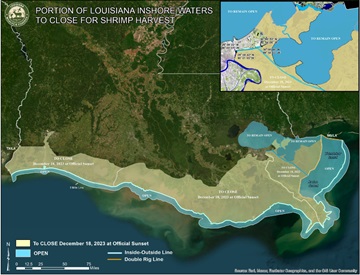 The Louisiana Department of Wildlife and Fisheries announced that the 2023 fall inshore shrimp season will close in all state inside waters on Monday, December 18, 2023, at official sunset, except for the following inside waters east of the Mississippi River: Lake Pontchartrain, Chef Menteur and Rigolets Passes, Lake Borgne, Mississippi Sound, Mississippi River Gulf Outlet (MRGO), a section of the Gulf Intracoastal Waterway (GIWW) in Orleans parish from the GIWW East Closure Sector Gate westward to the GIWW intersection with the Inner Harbor Navigation Canal, and the open waters of Breton and Chandeleur Sounds as bounded by the double-rig line described in R.S. 56:495.1(A)2. more, >>click to read<< 12:18
The Louisiana Department of Wildlife and Fisheries announced that the 2023 fall inshore shrimp season will close in all state inside waters on Monday, December 18, 2023, at official sunset, except for the following inside waters east of the Mississippi River: Lake Pontchartrain, Chef Menteur and Rigolets Passes, Lake Borgne, Mississippi Sound, Mississippi River Gulf Outlet (MRGO), a section of the Gulf Intracoastal Waterway (GIWW) in Orleans parish from the GIWW East Closure Sector Gate westward to the GIWW intersection with the Inner Harbor Navigation Canal, and the open waters of Breton and Chandeleur Sounds as bounded by the double-rig line described in R.S. 56:495.1(A)2. more, >>click to read<< 12:18
American Shrimp Processors Association Welcomes House China Select Committee’s Bipartisan Trade Enforcement Recommendations
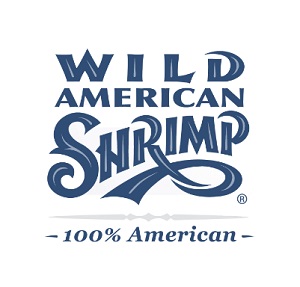 On December 12, 2023, the House Select Committee on the Chinese Communist Party adopted a bipartisan report with scores of policy recommendations to reset the terms of the U.S. economic relationship with China and help domestic producers compete in the face of China’s non-market practices. The American Shrimp Processors Association (ASPA) welcomed the recommendations focused on strengthening the enforcement of U.S. trade remedy laws as a key component of this strategy. “American shrimp processors and harvesters have been fighting China’s unfair trade practices for nearly twenty years,” said ASPA President Trey Pearson. “The domestic shrimp industry is made up of small, family-owned businesses, and we need our trade remedy laws to be strengthened and vigorously enforced for us to have a chance to compete with foreign producers and exporters supported by the Government of China.” more, >>click to read<< 09:46
On December 12, 2023, the House Select Committee on the Chinese Communist Party adopted a bipartisan report with scores of policy recommendations to reset the terms of the U.S. economic relationship with China and help domestic producers compete in the face of China’s non-market practices. The American Shrimp Processors Association (ASPA) welcomed the recommendations focused on strengthening the enforcement of U.S. trade remedy laws as a key component of this strategy. “American shrimp processors and harvesters have been fighting China’s unfair trade practices for nearly twenty years,” said ASPA President Trey Pearson. “The domestic shrimp industry is made up of small, family-owned businesses, and we need our trade remedy laws to be strengthened and vigorously enforced for us to have a chance to compete with foreign producers and exporters supported by the Government of China.” more, >>click to read<< 09:46
Shrimpers struggling as season draws to an end
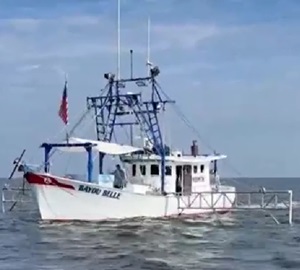 “When the season is good, we bring in around 20 to 30 [thousand] pounds a week,” said Victor Le, a deckhand on the Captain Can. “We have to sell all of it to get a little profit margin, but not as much as it used to be.”Le has worked in the Gulf for seven years. But it does not take a seasoned veteran to see a startling trend. “Everybody is struggling right now because of the price. The price is so down, the import is affecting us mainly. Undercuts our prices and everybody loses when comparing to import prices,” he said. more, video, <<click to read<< 11:35
“When the season is good, we bring in around 20 to 30 [thousand] pounds a week,” said Victor Le, a deckhand on the Captain Can. “We have to sell all of it to get a little profit margin, but not as much as it used to be.”Le has worked in the Gulf for seven years. But it does not take a seasoned veteran to see a startling trend. “Everybody is struggling right now because of the price. The price is so down, the import is affecting us mainly. Undercuts our prices and everybody loses when comparing to import prices,” he said. more, video, <<click to read<< 11:35
Executive director of shrimp processing group accused of stealing millions, police say
 Biloxi Police have arrested a man who they say stole more than $3 million from the American Shrimp Processing Association, all while serving as a top executive. Thursday, Biloxi PD arrested 79-year-old Charles David Veal of Gulfport and charged him with felony embezzlement. Police say the arrest stemmed from an investigation that started after the American Shrimp Processing Association reported that Veal, once the group’s executive director, had transferred funds from their nonprofit bank account and into his own personal account. more, >>click to read<< 11:01
Biloxi Police have arrested a man who they say stole more than $3 million from the American Shrimp Processing Association, all while serving as a top executive. Thursday, Biloxi PD arrested 79-year-old Charles David Veal of Gulfport and charged him with felony embezzlement. Police say the arrest stemmed from an investigation that started after the American Shrimp Processing Association reported that Veal, once the group’s executive director, had transferred funds from their nonprofit bank account and into his own personal account. more, >>click to read<< 11:01
Pushing pogy boats farther from Louisiana coast could dampen profits, kill jobs, report warns
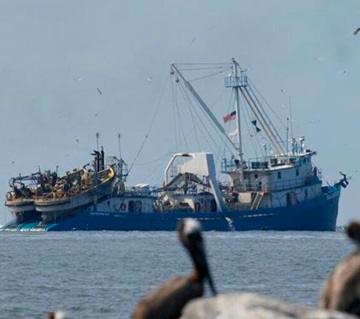 Pushing commercial menhaden fishing farther off the Louisiana coast may appease anglers and conservationists, but it would come at a heavy cost to the industry, according to a new report from state economists. The two companies operating what amounts to Louisiana’s largest fishery could lose about $31 million per year and shed up to 90 jobs if the state approves a plan to restrict menhaden fishing within a mile of the coast, an economic impact report by the state Department of Wildlife and Fisheries says. But the report’s lead author stressed that the industry could recoup some losses by fishing in deeper water. “They’d likely adjust practices,” Fish and Wildlife economist Jack Issacs said. “They’d make adjustments to counteract (the restrictions). The menhaden industry would likely take more trips offshore or concentrate more harvesting outside the mile-wide buffer.” Photos, more, >>click to read<< 12:38
Pushing commercial menhaden fishing farther off the Louisiana coast may appease anglers and conservationists, but it would come at a heavy cost to the industry, according to a new report from state economists. The two companies operating what amounts to Louisiana’s largest fishery could lose about $31 million per year and shed up to 90 jobs if the state approves a plan to restrict menhaden fishing within a mile of the coast, an economic impact report by the state Department of Wildlife and Fisheries says. But the report’s lead author stressed that the industry could recoup some losses by fishing in deeper water. “They’d likely adjust practices,” Fish and Wildlife economist Jack Issacs said. “They’d make adjustments to counteract (the restrictions). The menhaden industry would likely take more trips offshore or concentrate more harvesting outside the mile-wide buffer.” Photos, more, >>click to read<< 12:38
Seeking Shrimpers to Help Modernize Data Collection
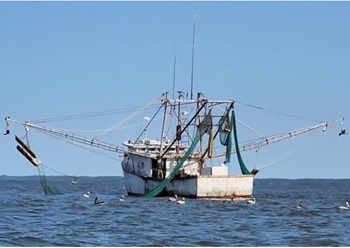 NOAA Fisheries and the Gulf States Marine Fisheries Commission are encouraging the early adoption of a new system to update the data collection process for Gulf of Mexico shrimping effort. The new system will greatly increase the quality and efficiency of data collected to describe the Gulf shrimp commercial fleet and reduce burden on the shrimping industry. The new devices are now available at no cost for a limited number of participants. The program will cover the cost for a limited number of cellular vessel monitoring system units, installation and maintenance, and 2 years of cellular service for the new device. We are seeking volunteers for this early adopter program through September 2024.Support through the early adopter program is available on a first come, first serve basis. more, >>click to read<< 07:53
NOAA Fisheries and the Gulf States Marine Fisheries Commission are encouraging the early adoption of a new system to update the data collection process for Gulf of Mexico shrimping effort. The new system will greatly increase the quality and efficiency of data collected to describe the Gulf shrimp commercial fleet and reduce burden on the shrimping industry. The new devices are now available at no cost for a limited number of participants. The program will cover the cost for a limited number of cellular vessel monitoring system units, installation and maintenance, and 2 years of cellular service for the new device. We are seeking volunteers for this early adopter program through September 2024.Support through the early adopter program is available on a first come, first serve basis. more, >>click to read<< 07:53
Hyde-Smith, Cotton & Scott Introduce Bill to Ban Chinese Seafood Imports
 WASHINGTON, D.C. – U.S. Senator Cindy Hyde-Smith (R-Miss.) today joined U.S. Senators Tom Cotton (R-Ark.) and Rick Scott (R-Fla.) in introducing legislation to ban U.S. imports of seafood and aquaculture products from China. The Ban China’s Forbidden Operations in the Oceanic Domain (Ban C-FOOD) Act would also sanction companies that import Chinese seafood and place tariffs on countries that facilitate the shipment of the seafood. “It’s past time we hold China accountable for its persistent violation of sovereign waters and its shameless use of slave labor to dominate the aquaculture market with unsafe, chemical-ridden products. more, >>click to read<< 09:01
WASHINGTON, D.C. – U.S. Senator Cindy Hyde-Smith (R-Miss.) today joined U.S. Senators Tom Cotton (R-Ark.) and Rick Scott (R-Fla.) in introducing legislation to ban U.S. imports of seafood and aquaculture products from China. The Ban China’s Forbidden Operations in the Oceanic Domain (Ban C-FOOD) Act would also sanction companies that import Chinese seafood and place tariffs on countries that facilitate the shipment of the seafood. “It’s past time we hold China accountable for its persistent violation of sovereign waters and its shameless use of slave labor to dominate the aquaculture market with unsafe, chemical-ridden products. more, >>click to read<< 09:01
Athearn Marine Agency Boat of the Week: 92′ Rodriguez Scalloper/Shrimper
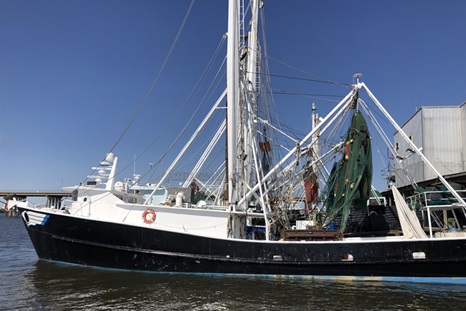 To review specifications, information, 35 photos’, and a video, >click here<, To see all the boats in this series, >click here< 10:50
To review specifications, information, 35 photos’, and a video, >click here<, To see all the boats in this series, >click here< 10:50
UPDATE: Coast Guard suspends search for F/V Miss Winnie fisherman
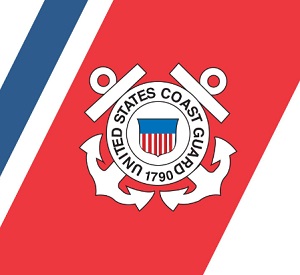 The Coast Guard suspended its search at roughly 5:30 p.m. Monday for a missing commercial fisherman roughly 138 miles southwest of Port Fourchon, Louisiana. Crews searched more than 46 hours and over 2000 square miles. Assets involved in the search were: U.S. Coast Guard Aviation Training Center HC-144 Ocean Sentry, U.S. Coast Guard Air Station Corpus Christi HC-144 Ocean Sentry, U.S. Coast Guard Cutter Jacob Poroom Good samaritan commercial fishing vessel F/V Kenneth ColeThe Coast Guard suspended active search efforts after the probable search area was saturated with multiple assets and resources. The incident is currently under investigation. -USCG- >>click to read<< 08:45
The Coast Guard suspended its search at roughly 5:30 p.m. Monday for a missing commercial fisherman roughly 138 miles southwest of Port Fourchon, Louisiana. Crews searched more than 46 hours and over 2000 square miles. Assets involved in the search were: U.S. Coast Guard Aviation Training Center HC-144 Ocean Sentry, U.S. Coast Guard Air Station Corpus Christi HC-144 Ocean Sentry, U.S. Coast Guard Cutter Jacob Poroom Good samaritan commercial fishing vessel F/V Kenneth ColeThe Coast Guard suspended active search efforts after the probable search area was saturated with multiple assets and resources. The incident is currently under investigation. -USCG- >>click to read<< 08:45
‘Catalytic.’ How a bipartisan bill could save working waterfronts from Cape Cod to Alaska
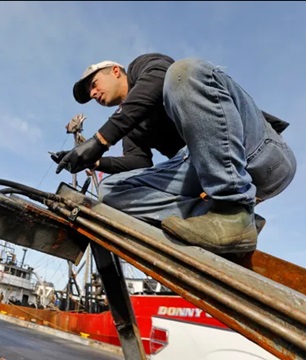
Andrew Spalt climbs the side of the new hydraulic dredge ramp he is installing aboard his boat Miss Emma.
The Working Waterfront Protection Act (S-3180) would establish a grant program that would support working waterfronts in coastal states, including the Great Lakes. The act would provide $20 million annually through fiscal 2028. Commercial fishing cooperatives, working waterfront owners and operators, nonprofit organizations and municipal and state governments would be eligible to apply. Fishing Communities Coalition Coordinator Noah Oppenheim said support is crucial because of pressures facing working waterfront owners and fishing communities nationwide. The coalition represents more than 1,000 independent small boat fishermen and business owners from Maine to Alaska, according to its website. 8 photos, more, >>click to read<< 09:38
Coast Guard searching Gulf for fisherman reported overboard from commercial vessel
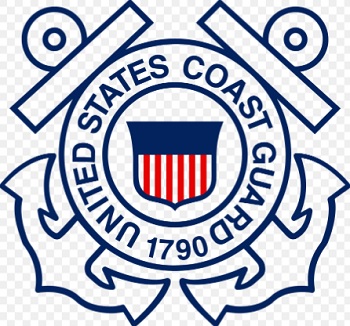 The US Coast Guard said it is searching a portion of the Gulf for a 35-year-old fisherman who reportedly fell overboard from a commercial fishing vessel early Saturday (Dec. 2), about 138 miles southwest of Port Fourchon. The man overboard report was radioed in around 2 a.m. from a vessel relaying the message from the commercial fishing vessel Miss Winnie, the USCG said in a statement. more, >>click to read<< We will update, as we get information. 14:00
The US Coast Guard said it is searching a portion of the Gulf for a 35-year-old fisherman who reportedly fell overboard from a commercial fishing vessel early Saturday (Dec. 2), about 138 miles southwest of Port Fourchon. The man overboard report was radioed in around 2 a.m. from a vessel relaying the message from the commercial fishing vessel Miss Winnie, the USCG said in a statement. more, >>click to read<< We will update, as we get information. 14:00
Locals want more rules for seafood imports
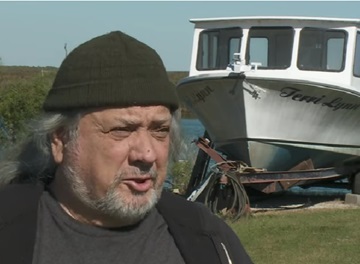 Only about 10% of seafood consumed in America is domestic. That’s crippling the Louisiana seafood industry. “For the last two years it’s just about ruined the industry,” Louisiana fisherman Pete Gerica said. In his 50 years on the water, Gerica has never seen it this bad. “There’s just so much you can take,” Gerica said. “Fuel prices being $4.00 a gallon. The cost of everything you buy, it’s just you can’t stay in business if you keep on spending money and you ain’t making none.” Monday, Congressman Garret Graves and Lt. Governor Billy Nungesser testified before the Louisiana Seafood Task Force in Baton Rouge. more, video, >>click to read<< 12:40
Only about 10% of seafood consumed in America is domestic. That’s crippling the Louisiana seafood industry. “For the last two years it’s just about ruined the industry,” Louisiana fisherman Pete Gerica said. In his 50 years on the water, Gerica has never seen it this bad. “There’s just so much you can take,” Gerica said. “Fuel prices being $4.00 a gallon. The cost of everything you buy, it’s just you can’t stay in business if you keep on spending money and you ain’t making none.” Monday, Congressman Garret Graves and Lt. Governor Billy Nungesser testified before the Louisiana Seafood Task Force in Baton Rouge. more, video, >>click to read<< 12:40
Rep. Garret Graves wants federal funding to reduce imported seafood, aid Louisiana fishery
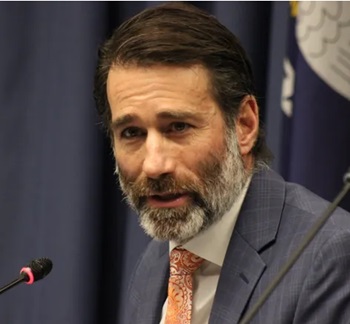 U.S. Rep. Garret Graves and Lt. Gov. Billy Nungesser are calling for more federal funding to test imported seafood and tighter regulations to slow the influx of foreign catch onto Louisiana’s seafood market. Both Graves and Nungesser shared separate though somewhat similar proposals recently with the Louisiana Seafood Safety Task Force, which is working to address a struggling domestic fishery and the increasing health threats from imported foreign seafood. Foreign catch has become so cheap that it now comprises nearly 90 percent of all seafood consumed in America, according to the Louisiana Seafood Promotion & Marketing Board. more, >>click to read<< 15:30
U.S. Rep. Garret Graves and Lt. Gov. Billy Nungesser are calling for more federal funding to test imported seafood and tighter regulations to slow the influx of foreign catch onto Louisiana’s seafood market. Both Graves and Nungesser shared separate though somewhat similar proposals recently with the Louisiana Seafood Safety Task Force, which is working to address a struggling domestic fishery and the increasing health threats from imported foreign seafood. Foreign catch has become so cheap that it now comprises nearly 90 percent of all seafood consumed in America, according to the Louisiana Seafood Promotion & Marketing Board. more, >>click to read<< 15:30
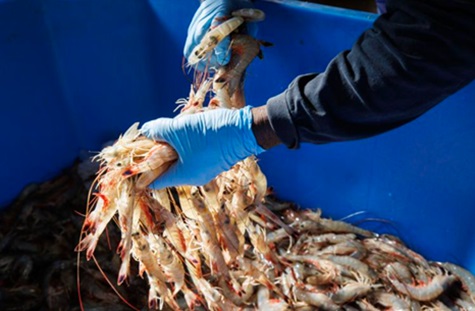
Editorial: South Carolina’s shrimpers are struggling; here’s 1 way to help
Those living in the Charleston area likely are well-familiar with the fact that our local shrimping industry has long been bruised by competition from imported shrimp, but the problem seems to have become more urgent than ever. Fortunately, there are steps we all can take to help out. As S.C. Shrimpers Association vice president Bryan Jones wrote in his recent letter to the editor, our state’s shrimping fleet has reached a critical juncture, threatening the livelihoods of thousands of families and a cherished way of life along our coast. That’s why our state’s association is joining with similar groups in other coastal states to press their case on both the state and federal levels, seeking an economic disaster declaration that would lead to short-term relief, such as low-interest loans and tax breaks. >>click to read<< 11:28
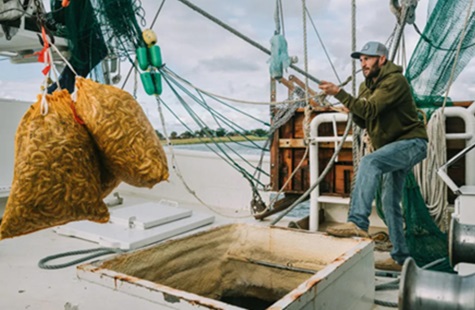
Coastal Georgia shrimpers fear loss of industry as foreign seafood crowds market
“Just when you think it can’t get any worse, it gets worse,” said Pat Mathews, the owner of the Lazaretto Packing Co. on Tybee Island, as he walked away from a truck idling in the loading zone. Early on a Monday morning in October in the height of shrimp season the driver had come to pick up a load of freshly caught shrimp from the James W. Salyers, a shrimp boat captained by David Attia. The driver delivered disappointing news, informing Pat that this would be the last load he would be able to pick up for the foreseeable future. The Mathews family has been in the seafood business for over a century. Where they once owned several seafood markets, their business now centers on the dock they own at Tybee, one of the few hubs of the industry that has been an iconic business on Georgia’s 100-mile coast. >>click to read<< 10:53
Lawmakers form Seafood Caucus to help Louisiana fishermen
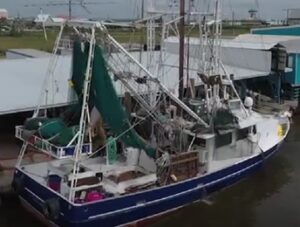 Consumers likely don’t think twice about where the shrimp or seafood bought at grocery store comes from, but Louisiana fisherman—and now federal lawmakers—are asking people to pay attention. “We’re losing an industry and a culture and a way of life in Louisiana and across the country,” said Acy Cooper, who comes from a long line of shrimpers. He says what was once a reliable profession has now become heartache. It’s not just a problem in Louisiana—which is why lawmakers from all four of the country’s coasts are joining together to find a solution. Video, >>click to read<< 10:28
Consumers likely don’t think twice about where the shrimp or seafood bought at grocery store comes from, but Louisiana fisherman—and now federal lawmakers—are asking people to pay attention. “We’re losing an industry and a culture and a way of life in Louisiana and across the country,” said Acy Cooper, who comes from a long line of shrimpers. He says what was once a reliable profession has now become heartache. It’s not just a problem in Louisiana—which is why lawmakers from all four of the country’s coasts are joining together to find a solution. Video, >>click to read<< 10:28
Save US shrimping industry. Buy domestic wild-caught shrimp.
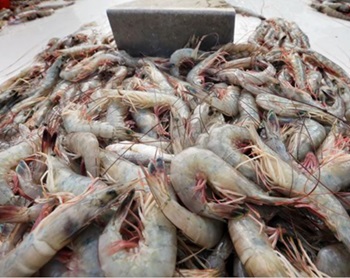 For decades, South Carolina’s shrimpers have faced challenges, but the imported shrimp crisis has reached a critical juncture. The influx of foreign shrimp, often at artificially low prices, is decimating our domestic shrimping industry, putting the livelihoods of thousands of South Carolina families at risk. The situation has changed dramatically in recent years. The rising tide of imported shrimp far outpaces shrimp consumption in the United States because of subsidized foreign production and lax trade enforcement. American shrimpers aren’t competing on a level playing field. We face an inflection point. If we do not take decisive action, the domestic shrimping industry will collapse, with devastating consequences for our coastal communities and the heritage of shrimping in South Carolina. >>click to read<< 09:06
For decades, South Carolina’s shrimpers have faced challenges, but the imported shrimp crisis has reached a critical juncture. The influx of foreign shrimp, often at artificially low prices, is decimating our domestic shrimping industry, putting the livelihoods of thousands of South Carolina families at risk. The situation has changed dramatically in recent years. The rising tide of imported shrimp far outpaces shrimp consumption in the United States because of subsidized foreign production and lax trade enforcement. American shrimpers aren’t competing on a level playing field. We face an inflection point. If we do not take decisive action, the domestic shrimping industry will collapse, with devastating consequences for our coastal communities and the heritage of shrimping in South Carolina. >>click to read<< 09:06
In Texas, Vietnamese American Shrimpers Must Forge a New Path Again
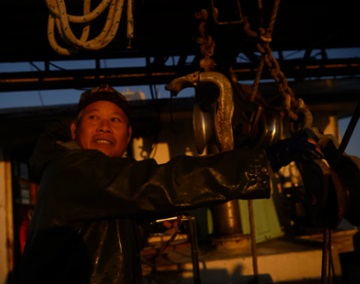 The sun was still rising when Vinh Nguyen hauled in his first catch of the day. For the next half-hour, he worked methodically, using his bare fingers to sort the slippery crustaceans from Matagorda Bay. The famed Texas brown shrimp went in one bucket. The Texas white shrimp in another. Seagulls and pelicans hovered around him in the cool, sticky air, while dolphins swam alongside the boat. All were eager for the discarded fish — free breakfast. By noon, Mr. Nguyen caught enough shrimp to take home about $600, a decent profit these days, but still less than in years past when $1,000 marked a good day. “Not much,” he frowned, as he stood on the slick deck assessing the ice chests that were now filled with shrimp. Photos, >>click to read<<07:35
The sun was still rising when Vinh Nguyen hauled in his first catch of the day. For the next half-hour, he worked methodically, using his bare fingers to sort the slippery crustaceans from Matagorda Bay. The famed Texas brown shrimp went in one bucket. The Texas white shrimp in another. Seagulls and pelicans hovered around him in the cool, sticky air, while dolphins swam alongside the boat. All were eager for the discarded fish — free breakfast. By noon, Mr. Nguyen caught enough shrimp to take home about $600, a decent profit these days, but still less than in years past when $1,000 marked a good day. “Not much,” he frowned, as he stood on the slick deck assessing the ice chests that were now filled with shrimp. Photos, >>click to read<<07:35
Man with rifle fires 2 shots across commercial fisherman’s bow off Florida Keys
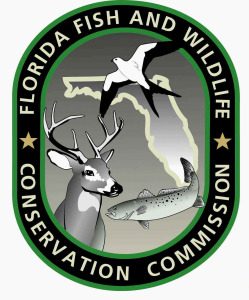 An argument between a recreational angler and a commercial fisherman off the Florida Keys nearly turned fatal Tuesday morning when the angler fired a rifle across the bow of the other man’s boat, police said. The incident happened around 9 a.m. on the oceanside of the Keys, about seven miles off Rodriguez Key, which is east of Key Largo, according to the Florida Fish and Wildlife Conservation Commission, the lead investigating agency. Arielle Cellender, an FWC spokeswoman, said the two men’s vessels were close to each other when they began arguing. >>click to read<< 07:01
An argument between a recreational angler and a commercial fisherman off the Florida Keys nearly turned fatal Tuesday morning when the angler fired a rifle across the bow of the other man’s boat, police said. The incident happened around 9 a.m. on the oceanside of the Keys, about seven miles off Rodriguez Key, which is east of Key Largo, according to the Florida Fish and Wildlife Conservation Commission, the lead investigating agency. Arielle Cellender, an FWC spokeswoman, said the two men’s vessels were close to each other when they began arguing. >>click to read<< 07:01
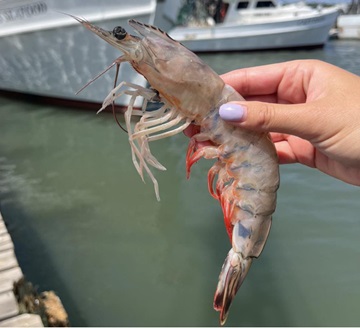
‘Catastrophic crisis’: Imported shrimp flood US market
Foreign shrimp imports are overwhelming the country’s inventories of shrimp and driving market prices for locally sourced shrimp to record lows, prompting widespread calls from elected officials and organizations throughout southern Atlantic and Gulf Coast states for the federal government to declare a fishery resource disaster. Governors of coastal states from North Carolina to Florida to Texas are being pressed to ask U.S. Commerce Secretary Gina Raimondo to determine a fishery resource disaster for the South Atlantic and Gulf of Mexico shrimp fishery. In what one North Carolina coastal county’s board of commissioners refer to as an “unprecedented catastrophic crisis,” shrimpers are struggling to maintain operations because they’re making substantially less for their catch while paying historically high fuel prices and other inflation-driven costs. Shrimpers are also being forced to dock their freezer boats, or vessels with onboard freezers, because they can’t move their product in a market flooded with frozen shrimp from overseas. >>click to read<< 09:40
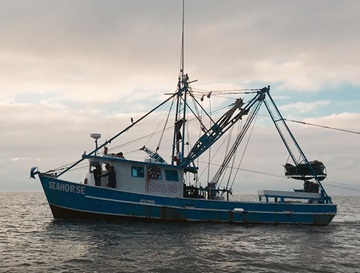
Gulf Coast wins against ‘far-left activists’ in NOAA decision, Alabama officials say
U.S. Sens. Katie Britt and Tommy Tuberville applauded the National Oceanic and Atmospheric Administration rejecting a petition to establish a mandatory 10-knot speed limit and other vessel-related mitigation measures in the Gulf of Mexico.“I was glad to see the NOAA come to their senses and reject this part of the Biden Administration’s overreaching regulatory agenda in the Gulf of Mexico,” said Tuberville (R-Auburn), who has written two letters to administration officials on the issue. “Unfortunately, we still have a long way to go. Designating a Critical Habitat for the Rice’s whale throughout this expansive area would impose undue burdens and restrictions on all vessel traffic, especially in and out of the Port of Mobile.” >>click to read<< 10:09
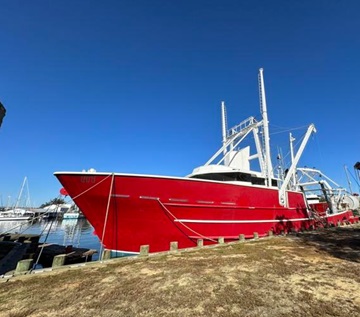
County lawmakers request fishery resource disaster determination amidst nationwide shrimp disaster
On Sept. 18 the Pamlico County Commissioners adopted a resolution urging North Carolina Governor Roy Cooper to consider submitting a request for a fishery resource disaster determination to the NC Secretary of Commerce. Craven County followed suit and adopted a similar resolution on October 2. According to these resolutions, the global supply of farm-raised shrimp imports into the United States has reached record highs. This imported shrimp now dominates cold storages, distribution hubs, and the American market at a level that is devastating to US operators. This influx of imported shrimp into the American market has caused significant revenue loss, and loss of access to the shrimp fisheries themselves, for small family-owned supporting businesses, and other supporting businesses. >>click to read<< 09:47
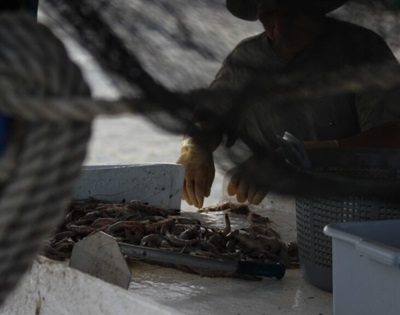
That ‘Gulf’ shrimp you ate probably wasn’t from the Gulf of Mexico
What if every imported seafood product for sale in Louisiana had a red sticker with the word “Imported” affixed to the front of its packaging? That question is one of several the state Seafood Safety Task Force is asking in an effort to address a struggling domestic fishery and increasing health risks from imported catch. The task force met Friday for just the second time in over a decade following a long dormant period that ended last month. State Sen. Fred Mills, R-St. Martinville, chairs the task force that he said will try to develop solutions to address three areas: the health and safety of consumers, the economy of the domestic seafood sector, and consumer education. An influx of cheap foreign catch has flooded the seafood market in Louisiana, and most restaurants in the state choose to serve imported shrimp and crawfish to patrons who are either oblivious to it or mistakenly believe they’re eating local fare, according to the Louisiana Shrimp Association. The effects have decimated a local industry and unique Louisiana culture while also potentially introducing harmful contaminants into the food supply. >>click to read<< 11:52
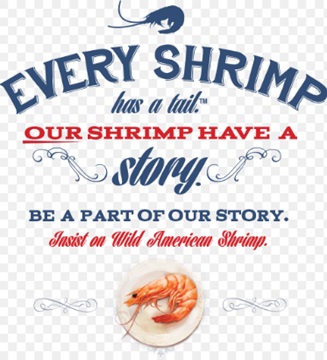
American Shrimp Processors Association Launches Trade Petitions Addressing Unfair Dumping and Illegal Subsidies
Today, the American Shrimp Processors Association (ASPA) filed trade petitions seeking antidumping duties on imported frozen warmwater shrimp from Ecuador and Indonesia and countervailing duties on imported shrimp from Ecuador, India, Indonesia, and Vietnam. The U.S. shrimp market has been overwhelmed by massive quantities of underpriced shrimp imports, resulting in unsustainably low dockside prices, falling domestic market share, significantly lower profit margins, and historically high inventory levels. >>click to read<< 07:56
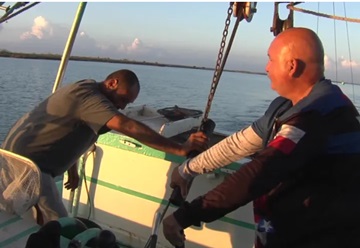
Texas: Bay Shrimpers
Just about every day of the week you can find Vito Sandoval and Ricardo Rodriguez plying the waters of the Brownsville ship channel dragging their net to provide local bait stands with live shrimp. With the sun just clearing the horizon, they are on the water and getting ready to haul in their first drag of the day. They are an efficient team and while Rodriguez expertly separates the shrimp from “bycatch,” Sandoval returns to the Captain’s chair, where he is right at home as bay shrimping is a family tradition. “My dad did it for many, many years. He is the one that got me going around 12 years old that’s when I started coming with him on the weekends and the summertime, and I loved it,” said Vito Sandoval. Video, photos, >>click to read<< 09:06

Offshore Wind Is A Dangerous Pipe Dream Costing Taxpayers Billions
How many times have we heard that wind power, coupled with the sun’s energy, is going to save us from our fossil-fuel-burning ways? Maybe one day it will. But at no time soon will it happen. And by soon, we mean in most of our lifetimes. How can we say this? Look around at what’s happening with wind energy [emphasis, “California’s Central Coast residents work to stop — or at least slow down — offshore wind.”,,, “Orsted Threatens To Abandon U.S. Offshore Wind Projects.” Biden administration guarantees more support.,, “Electricity from wind isn’t cheap and it never will be.” The list above is no more than a start. There are many more stories we could have cited, and there are many more to come. Wind energy is unreliable, and its costs are not competitive at scale. Lots of links! >>click to read<< 18:22






